April 2, 2024
Conferences

🌐follow Marie-Anne Frison-Roche on LinkedIn
🌐subscribe to the Newsletter MAFR Regulation, Compliance, Law
____
► Full Reference: M.-A. Frison-Roche, "Les voies d'innovations juridiques face aux nouveaux "défis climatiques" ("Innovative legal solutions to the new "climate challenges""), in C. Arnaud, O. de Bandt et B. Deffains (dir.), Nouveaux défis - Regards croisés : Droit, Économie et Finance. Quel Droit face au Changement Climatique ? (("New challenges - Crossed perspectives : Law, Economics and Finance. What Law in the Face of Climate Change?"), Banque de France (French Central Bank) and CRED/Paris Panthéon-Assas University, Paris, Centre de Conférence de la Banque de France, April 2, 2024
____
🧮See the full programme of this event
____
🔲see the slides, basis of this conference (in French)
____
► Summary of this conference: In response to the question of how the Law can produce 'innovations' to meet the 'climate challenges', the process is based on the three traditional sources of Law, which are, firstly, laws and regulations, secondly, the commitments of individuals, mainly contracts, and thirdly, court rulings.
At first sight, the Law in its traditional conception and practice is weak in the face of climate change. This weakness is inherent in the nature of climate change, which is at once future, global and systemic, in the face of these three sources of Law, which do not address all three dimensions at once. The scale of the legal innovation required to ensure that one or more articulated sources can grasp the future, the global and the systemic is therefore clear. And yet this is what is happening.
As far as laws and regulations are concerned, they do not seem very appropriate because they are, by their very nature, a territorial limit, and international treaties are very difficult to negotiate. The interweaving of European regulations, for example the CSRD and the CS3D, which mirror each other, may be more effective. As far as 'commitments' are concerned, a concept which in Law is not very precise outside of contracts and liability cases, contracts are above all a means for companies to fulfill their legal obligations, and a contract always implies a judge. At first sight, however, the judge is the least well placed to respond to 'climate challenges', particularly in France where he is said or wished to be powerless, where he rules on the past and where, especially the civil judge, he settles a one-off dispute between two singular parties.
But a major change has occurred with the emergence of a new branch of law: the Compliance Law, a teleological branch of Law whose legal normativity is lodged in the Monumental Goals that it pursues, namely the preservation of systems, for example the climate system. In France, the so-called "Sapin 2" law in 2016, followed by the so-called "Vigilance" law in 2017, illustrate this. And the Judge is at the centre of it all.
In this global, systemic, extraterritorial perspective, the object of which is the future - Compliance Law is, moreover, rejected by many legal experts - the legislative innovation is major. Indeed, the law of 23 March 2017, known as "Vigilance" designated large companies, because they are "powerful", because they are "in a position to act" to "detect and prevent" breaches of the environment and human rights. The 2017 law copied the "compliance tools" put in place by the Sapin 2 anti-corruption law: risk mapping, plans, alerts, audits, internal investigations, and so on.
Only large companies are subject to the Compliance Law, notably the Vigilance Law, since they are the only ones in a position to act, in this case "parent companies or principals", and borders are no longer limits since the obligation, creating personal liability for the company, extends throughout the "value chain". The notion and fact of "systemic dispute" is emerging before the courts. In France, the Paris Court of First Instance has exclusive jurisdiction. European legislation is proving more difficult to draw up, because although it is compulsory to provide information on these "extra-financial" subjects (CSRD), the directive on the duty of vigilance, which has just been adopted, does not go any further than the French law of 2017.
On the second point, that of commitments, we are only at the beginning. Judges do not transform ethical statements into "unilateral legal commitments", and vigilance does not transform company law into co-management. But contracts do form a global network through which companies adjust their various legal obligations. This is why arbitrators, the only "global judges", will soon be involved in this systemic litigation, and more general case law is to come on "contracts and compliance clauses".
But the most innovative aspect undoubtedly comes from the courts. Perhaps and notably in France because it is from where we least expect it, the civil courts, that the imagination comes, but also the guarding of the great principles of the Rule of Law, because for the moment the case law is reasonable. This innovation has not come about proprio motu: the judges are not taking action, it is the NGOs that are conducting a kind of litigation policy, systematically giving formal notice to the major energy companies, but also to the major banks and insurers on climate issues, alleging non-compliance with their vigilance plans. The interim relief judge at the Paris Court of First Instance must then provide answers in systemic disputes, of which the so-called "Total Uganda" case is an example.
The courts are demonstrating a great deal of innovation. The Court of First Instance's interim relief judge has appointed amici curiae, the Paris Court of Appeal has set up a specialised chamber, and training conferences have been set up on this "Emerging Systemic Litigation".
In conclusion, the Law is in the process of being rebuilt through a new branch of Law, the Compliance Law, whose the very purpose, as an extension of and going beyond the Regulatory Law, is to preserve systems, in particular the climate system, in a profoundly renewed role for judges.
________
Sept. 28, 2023
Conferences
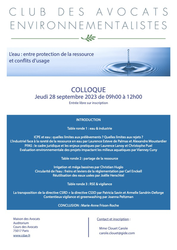
♾️follow Marie-Anne Frison-Roche on LinkedIn
♾️subscribe to the Newsletter MAFR Regulation, Compliance, Law
____
► Full Reference: M.-A. Frison-Roche, "Conclusion", in Club des avocats environnementalistes, L’eau : entre protection de la ressource et conflits d’usage, Maison des Avocats, Auditorium, September 28, 2023.
____
🧮see the full programme of this event
________
July 13, 2023
Thesaurus : Doctrine
► Référence complète : N. Ida, "Contrat et devoir de vigilance des sociétés", JCP E, n° 28, 13 juillet 2023, pp.17-26.
____
► Résumé de l'article (fait par l'auteur) : "Le contrat constitue l’instrument indispensable de déploiement de la vigilance sociale et environnementale dans les « chaînes de valeur » des sociétés donneuses d’ordre. Pourtant, la loi n° 2017-399 du 27 mars 2017 sur le devoir de vigilance des sociétés mères et entreprises donneuses d’ordre n'évoque pas le contrat, dont les liens avec le devoir de vigilance ont en conséquence été peu étudiés. Ce silence étonne car les sociétés concernées ne peuvent exercer leur devoir légal qu’en devenant créancières d’obligations de vigilance au moyen de clauses insérées dans leurs contrats commerciaux. Cette vigilance contractuelle imposée par la loi et bientôt par la directive européenne en cours d’adoption ne pourra atteindre son but qu’à la condition d’adapter les clauses de vigilance aux spécificités des relations contractuelles entretenues avec les fournisseurs et sous-traitants des sociétés donneuses d’ordre.".
____
🦉Cet article est accessible en texte intégral pour les personnes inscrites aux enseignements de la Professeure Marie-Anne Frison-Roche
________
July 10, 2023
Thesaurus : Doctrine
► Référence complète : R. Maurel, « Directive vigilance des entreprises en matière de durabilité. À propos de la proposition ambitieuse du Parlement européen », JCP G, n° 27, 10 juillet 2023, pp. 1304-1306.
____
► Résumé de l'article :
____
🦉Cet article est accessible en texte intégral pour les personnes inscrites aux enseignements de la Professeure Marie-Anne Frison-Roche
________
July 10, 2023
Public Auditions
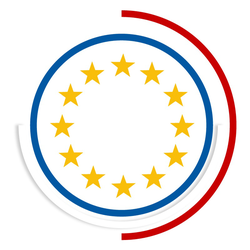
🌐suivre Marie-Anne Frison-Roche sur LinkedIn
🌐s'abonner à la Newsletter MAFR Regulation, Compliance, Law
____
► Référence complète : M.-A. Frison-Roche, audition par les rapporteures de la Commission des affaires européennes de l'Assemblée Nationale, Sophia Chikirou et Mireille Clapot dans le cadre de l'élaboration du Rapport sur devoir de vigilance des entreprises, 7 juin 2023.
____
Ce résumé a été publié après la publication du rapport parlementaire, pour ne pas gêner l'élaboration de celui-ci.
► Résumé de l'audition : À la demande des députées, il n'y a pas eu de présentation ex cathedra mais plutôt une discussion à partir de questions posées par celles-ci.
La première demande faite par Sophia Chikirou a été de formuler une définition de ce qu'est la "Régulation", puisque j'ai été présentée au début de l'audition comme ayant eu un rôle déterminant dans l'élaboration du Droit de la Régulation.
J'ai donc expliqué à la fois la façon dont les régulations peuvent être d'origines techniques ou politiques (souvent un mixte des deux), la place corrélative de l'Etat, l'évolution de cela depuis 20 ans, la constance du Droit de la Régulation au-delà de la diversité des secteurs et des sensibilités politiques des Gouvernements successifs, et l'importance du projet Européen.
J'ai montré que le Droit de la Régulation est par nature Ex Ante, porte sur l'avenir qu'il construit, demeure pour maintenir un équilibre par nature instable, l'Autorité de régulation n'étant que l'indice du Droit de la Régulation et non pas sa source.
Puis j'ai montré que la Compliance, dont la Vigilance est la pointe avancée, est le prolongement du Droit de la Régulation, le Droit de la Compliance ayant la même logique Ex Ante, trouvant sa normativité dans les buts poursuivis. Mais elle déploie le Droit de la Régulation et en démultiplie l'ambition puisqu'elle charge les entreprises de concrétiser ses buts, qu'elles le veuillent (RSE) ou qu'elles ne le veuillent pas (par exemple Sapin 2) avec une portée naturellement extraterritoriale. En cela le Droit de la Compliance est tout à fait ancré, ancré dans le Droit de la Régulation, et constitue une sorte de Révolution, dont la loi de 2017, dite "loi Vigilance", est la plus perceptible manifestation.
C'est ainsi opérée le passage du Droit de la Régulation au Droit de la Compliance, lequel a transformé les Autorités de Régulation, qui construisent, surveillent et maintiennent en équilibre les structures des secteurs en Autorités de Supervision, car la Supervision porte techniquement sur les opérateurs (ce que font les contrôles mis en place par la Vigilance) et non sur les structures, lesquelles sont prises en charge par les opérateurs (par exemple dans les chaines de valeur).
Cela explique que techniquement le Droit de la Vigilance emprunte au Droit de la Régulation et de la Supervision bancaire, car le secteur bancaire gère les risques systèmiques par la solidité et la puissance des acteurs bancaires et les outils sont les mêmes.
On se rend compte aujourd'hui de cette logique systémique de la Vigilance mais cela était déjà visible dès 2016📎
La deuxième demande faite par Sophia Chikirou a porté sur le sens du projet de directive, notamment ses enjeux et son effectivité au regard de ces explications, apparaissant comme nouvelles et éclairantes.
J'ai montré que ce texte est effectivement important et doit être compris comme l'expression politique d'une Europe qui a une sorte de "plan". Ainsi la CS3D doit se comprendre comme le texte gémellaire de la CSRD. De la même façon la loi de 2017 doit se comprendre au regard de ce plan européen. Lequel doit embrasser le DMA et le DSA. Tout cela est du Droit de la Compliance, dont la Vigilance est, et dès la loi de 2017, la "pointe avancée".
Tout le sens, et c'est le même dans tous les textes, est dans les buts. Ce sont des buts systémiques, qui portent sur le futur : éviter dans le futur une catastrophique, faire en sorte par une action présente qu'elle n'arrive pas (but "négatif"), ou (si l'on est encore plus ambitieux) faire en sorte que quelque chose arrive (but "positif") : équilibre climatique, respect d'autrui, égalité effective, probité, dignité, comme principes de fonctionnement des systèmes.
Pour cela, et pragmatiquement puisqu'il s'agit d'obtenir de l'effectivité, l'on repère les organisations qui peuvent réaliser cela : les entreprises. Plus elles sont puissantes et plus cela est possible. La puissance des entreprises n'est pas seulement bienvenue : elle est nécessaire. Le Droit de la Compliance constitue donc, et les textes qui l'expriment, une alliance entre l'Etat et les entreprises, et non pas une défaite de l'Etat (puisqu'il est plus ambitieux que jamais), la puissance des entreprises étant recherchée et devant s'exprimer.
Plus précisément, il s'agit (trilogie essentielle en Droit de la Compliance) d'obtenir l'effectivité, l'efficacité et l'efficience des textes. J'ai expliqué la définition de ces trois notions et leur articulation en pratique, notamment sur le terrain probatoire.
La troisième demande faite par Mireille Clapot a porté sur la présentation faite par moi de la logique préventive du système de Compliance, de Vigilance et notamment dans la loi de 2017, mais elle observe que le centre du dispositif est bien la réparation du dommage et non la prévention.
Effectivement, j'ai donc développé cette question essentielle de l'Ex Ante et de l'Ex Post, pour montrer que les débats avaient lieu à juste titre car le fonctionnement du dispositif n'étaient pas encore fixés par la jurisprudence. Mais si le Droit de la Régulation est bien de l'Ex Ante, le Droit de la Compliance, puisqu'il est entré dans l'entreprise même et dans des supervision, est davantage dans un continuum entre l'avant et l'après : ainsi une notion-clé est la "durabilité" (dans le titre même de la directive) et sous la "responsabilité" ce que l'on demande à l'entreprise c'est avant tout de rendre des comptes de l'usage qu'elle a fait de sa puissance (accountability), mais de sauver le monde (puisqu'à l'impossible nul n'est tenu). Si le dommage est survenu, sa responsabilité est acquise, mais l'enjeu central est de prévenir la survenance d'un dommage systémique, autant que faire se peut, voire d'améliorer les systèmes.
La quatrième demande, faite par Sophia Chikirou a porté sur la mise en place par chaque Etat-membre d'une autorité de régulation.
J'ai souligné la différence entre une Autorité de Régulation et, ce dont il s'agit ici, d'une Autorité de Supervision, la mission dont il s'agit ici étant de superviser les entreprises en charge du devoir de vigilance.
Dans son état actuel le texte ne précise pas la forme juridique institutionnelle que devrait prendre l'organe en charge de cette supervision. La difficulté technique vient du fait qu'il ne s'agit pas d'un secteur et qu'il est difficile de construire un "régulateur sans secteur" ou un superviseur ayant grand pouvoir sur ce qui n'est pas un secteur, sauf à faire autant d'Autorités qu'il y a d'industries concernées, ce qui produirait une myriade d'institutions... C''est sans doute techniquement le sujet le plus difficile dans la transposition, l'exemple allemande pouvant aider le Législateur français.
La cinquième demande faite par les deux députées porte sur la façon dont les entreprises peuvent assumer de telles obligations engendrées par ces textes, certains affirmant que cela est impossible.
J'ai expliqué que pour ma part il faut raison garder et que ce sont les juges qui sont gardiens de cela. Les entreprises ne peuvent pas sauver le monde, mais ce n'est pas ce que les textes leur demande et ce serait méconnaitre l'esprit des textes que d'affirmer cela.
Les entreprises ne sont assujetties au devoir de vigilance qu'en raison de leur aptitude à agir (détecter, prévenir, éduquer, ajuster les comportements, etc.), c'est-à-dire parce qu'elles "sont en position", non pas parce qu'elles seraient déjà "coupables". C'est un contresens que de dire cela.
C'est une chance pour l'Etat d'avoir sous sa main des entités qui ont la puissance de porter ses ambitions et c'est aussi pour cela qu'il faut absolument que le Droit de la Compliance, dont la Vigilance fait partie, soit de portée extraterritoriale, pour qu'il n'y ait pas d'effet d'aubaine.
L'entreprise fait ensuite ce qu'elle peut. Elle doit donner à voir ce qu'elle fait, dire ce qu'elle fera, le dire aux personnes concernées et au juge qui sera éventuellement saisi, l'exprimer au regard des buts monumentaux (changer le futur...) négatifs et positifs qui donne sens à tout le système : tout cela mais pas plus que cela.
La sixième demande faite par Mireille Clapot a porté sur l'impact négatif que la loi de 2017, puis potentiellement la Directive, peuvent avoir sur des contrats, notamment internationaux, conclus par des entreprises français.
J'ai tout à fait souligné comme elle le caractère essentiel de cette analyse économique du Droit. C'est pour cela d'une part que dans les contrats les entreprises soient incitées à insérer des "clauses de compliance", dont les "clauses de vigilance" font partie (notion que j'ai proposée), que les juges interprètent et appliquent celles-ci en articulant Droit des contrats et Droit de la compliance, et que leur portée à la fois sur les tiers et sur d'autres territoires soient reconnues.
En effet le Droit de la Compliance, dont la Vigilance est la pointe avancée, est une façon d'humaniser l'économie et non de remettre en cause le principe de liberté qui doit continuer à animer celle-ci. Le contrat est un outil essentiel de détecter et de prévenir et les entreprises doivent pouvoir l'utiliser librement. J'ai développé sur ce point le rôle que le juge, y compris le juge de droit commun, va jouer.
____
► Voir dans mes travaux ceux qui peuvent présenter un intérêt au regard de cette discussion menée par les deux Rapporteures⤵️
🕴️M.-A. Frison-Roche, 🎤Le rôle du Juge dans le déploiement du Droit de la Régulation en Droit de la Compliance, et le document de travail sous-jacent : juin 2023.
🕴️M.-A. Frison-Roche, 🚧La vigilance, pièce d'un puzzle européen, mars 2023.
🕴️M.-A. Frison-Roche, 🚧Penser et manier la Vigilance par ses Buts Monumentaux de Compliance, mars 2023.
🕴️M.-A. Frison-Roche, 📝Contrat de compliance, clauses de compliance, mars 2022.
🕴️M.-A. Frison-Roche, 🚧L'invention de la vigilance : un terme nouveau pour une Responsabilité en Ex Ante, février 2021.
🕴️M.-A. Frison-Roche, 📝Le Droit de la compliance, 2016.
____
►lire le rapport parlementaire
________
🕴️M.-A. Frison-Roche, 🚧Compliance Law, 2016.
June 28, 2023
Thesaurus : Soft Law
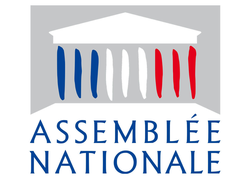
► Référence complète : Assemblée Nationale, Rapport d'information sur le devoir de vigilance des entreprises en matière de durabilité, déposé par la Commission des affaires européennes, présenté par Madame la députée Sophia Chikirou et Madame la députée Mireille Clapot, 28 juin 2023.
____
________
June 14, 2023
Conferences
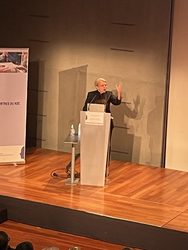
🌐follow Marie-Anne Frison-Roche on LinkedIn
🌐subscribe to the Newsletter MAFR Regulation, Compliance, Law
____
► Full Reference: M.-A. Frison-Roche, "L'esprit des Lois en matière de vigilance" ("Spirit of Law in Vigilance (Due Diligences) matters"), in Haut Conseil du Commissariat aux Comptes (H3C), Réalités et défis de la CSRD - Perspectives du devoir de vigilance, Paris, 14 June 2023.
____
🎥watch the video of a part of the speech (in French)
____
🧱read the description of the speeches of other speakers of this panel (in French)
____
The speech took place during the third-round table devoted to the Perspectives du devoir de vigilance (Perspectives of the duty of vigilance), the first round table having been devoted to the lessons that the DPEF can provide for the CSRD, and the second to the transposition work of the CSRD.
🧮See the full programme of this annual event (in French)
____
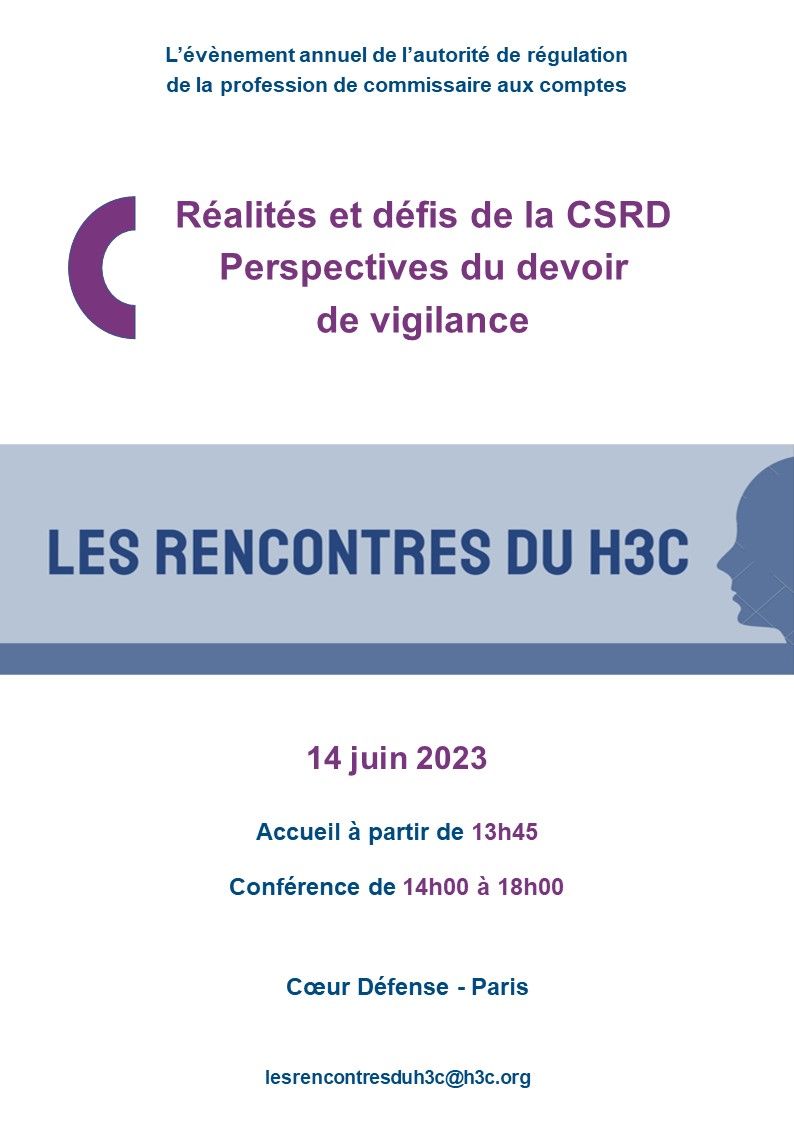
► English summary of the speech: In consideration of and in addition to what has been said, explained and even affirmed by other speakers, I have emphasised that 'vigilance" laws is not a 'regulation' like any other, but the leading edge of a very vast movement, Compliance Law, in which the 2017 French law is the driving force. For its application, the Judge, who is at the centre because of the will of the Legislator, is already taking into consideration the CS3D, the twin text of the CSRD.
The texts must not be seen in isolation. If we isolate them from each other, they become almost incomprehensible, their meaning appearing uncertain, even threatening: we need to understand the spirit of these texts, which are indeed new, because they aim to provide answers to the new world we have entered. We must all rejoice in this political ambition, which is taking a legal form, and work to make it efficient: Legislators, companies, auditors, Regulators and Judges.
If we do not stop at the letter, which would be to reduce Compliance to conformity, whereas Compliance Law, particularly Vigilance, is the extension of Regulation, finds its meaning in the Goals, we see that the French law of 2017, known as the "Vigilance law", which copies all the techniques of the French law known as "Sapin 2", gives goals simple to understand to the companies subject to the Legislator's will: detect and prevent environmental and human rights abuses in the value chains.
The logic is therefore Ex-Ante.
This Ex-Ante logic is retained by the CS3D directive.
The Judge is central to it. But the responsibility which the NGOs will ask him to trigger is itself an "Ex Ante responsibility", the Compliance trials being like "accountability" trials, to ensure that companies act in accordance with the Goals set by the Legislator.
This is transforming the role of the Judge, who must find effective solutions for the future. The discussion and the adversarial principle will become more important. Mediation will be encouraged. Stakeholders and the company will have to work together, and this method, which was intended by the Legislator for drawing up the vigilance plan, will be continued in the supporting legal proceedings.
This will also transform the company, and the role played by those who accredit the information on the company's actions and long-term strategies: auditors therefore have a central role to play.
________
May 25, 2023
Conferences
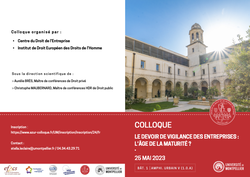
♾️ flollow Marie-Anne Frison-Roche on LinkedIn
♾️subscribe to the Newsletter MAFR Regulation, Compliance, Law
____
► Full Reference: M.-A. Frison-Roche, "Conclusions", in Ch. Maubernard et A. Brès (dir.), Institut de droit européen des droits de l'homme et Centre de droit de l'entreprise, Université de Montpellier, Le devoir de vigilance des entreprises : l'âge de la maturité?("The Entreprises duty of vigilance: the maturity age?") , Montpellier, May 25, 2023.
The conference is held in French.
____
🧮see the manifestation programme (in French)
___
🌐 read the report done on LinkedIn (in French)
___
► English summary of this final speech of the manifestation: It is rather difficult to draw a conclusion after listening so many contributions. For three reasons: firstly, because of their richness and extreme diversity; secondly, because of the fact that we do not know whether the duty of vigilance is under the French law of 2017 (known as the Vigilance Law) or in other national, European and international texts or beyond or below the legal rules; thirdly, because we do not know what is meant by the "maturity" of a legal concept. But in the end, since the question posed by the title itself of the colloquium is Duty of Vigilance: the age of maturity? the answer is clearly: no.
But this is regrettable. It is therefore essential to explore the ways in which the duty of vigilance can mature. If we find merit in this duty which has now entered the legal system, there are eight intersecting avenues, which must be exploited.
The first path is progression through the passage of time, rediscovering what in the past was already vigilance and what in the future will be its deployment.
The second way is to progress by fixing the vocabulary, because we are witnessing a great battle of words, overtly or covertly, in French or English.
The third path is progression through the emergence of principles, or even a principle, rediscovered or invented.
The fourth path is progression through coherence brought to the legal system(s), which at present suffer from gaps and inconsistencies, which could be remedied by methods such as centralising litigation or, more radically, ignoring borders.
The fifth path is progression through the fact that it works, because vigilance techniques are those of Compliance, of which vigilance is the leading edge, and the challenge is to find solutions.
The sixth path is progression through using power of the legal system not only to create new areas of relevance - starting with the notion of vigilance, but also that of the value chain - but also to impose new indifferences, namely indifference to the figure of the market (to which laws prefer the company and the value chain) and indifference to borders.
The seventh path is progression through bringing perspectives closer together, in order to find solutions even when interests are opposed. This is where the two techniques of contract and mediation are very welcome.
The eighth path is progression through culture, because the culture of vigilance, like the culture of compliance, must be developed within companies and supply chains, and must become common to them and their stakeholders.
____
________
May 8, 2023
Thesaurus : Soft Law
► Full Reference: Committee on Legal Affairs of the European Parliament, Report on the proposal for a directive of the European Parliament and of the Council on Corporate Sustainability Due Diligence and amending Directive (EU) 2019/1937, 8 May 2023.
____
________
Dec. 14, 2022
Thesaurus : 06.1. Textes de l'Union Européenne
► Full reference: Directive (EU) 2022/2464 of the European Parliament and of the Council, of 14 december 2022, amending Regulation (EU) n° 537/2014, Directive 2004/109/EC, Directive 2006/43/EC and Directive 2013/34/EU, as regards corporate sustainability reporting (called "CSRD" (Corporate Sustainability Reporting Directive)).
____
________
Sept. 7, 2022
Thesaurus : Doctrine
► Référence complète : G. Lhuilier, "La proposition de directive européenne sur le devoir de vigilance des entreprises en matière de durabilité", RDAI/IBLJ, n°5, 2022, p. 423-452.
____
► Résumé de l'article :
________
July 6, 2022
Thesaurus : Doctrine
► Full Reference: A. Danis-Fatome, "The proposal for a European Directive on the duty of vigilance: brief views on civil liability", International Business Law Journal, 5, 2022, p. 489-497.
____
► Summary of the article (done by the Journal of Regulation & Compliance):
________
June 16, 2022
Thesaurus : Doctrine
► Référence complète : J.-B. Barbièri, "Lanceur d’alerte et droit des sociétés", in Fr. Drummond & J. Icard (dir.), Le nouveau cadre légal des lanceurs d’alerte, JCP E, n° 24, 16 juin 2022, étude 1217, pp. 40-44
____
► Résumé de l'article (fait par l'auteur) : "Cette étude revient sur trois séries de questions soulevées par le nouveau statut du lanceur d’alerte issu de la loi du 21 mars dernier, à savoir les acteurs sociétaires bénéficiaires du statut de lanceur d’alerte et l’articulation du régime posé par la nouvelle loi avec des règles sociétaires et des dispositifs d’alerte existants.".
____
🦉Cet article est accessible en texte intégral pour les personnes inscrites aux enseignements de la Professeure Marie-Anne Frison-Roche
_______
June 16, 2022
Thesaurus : Doctrine
► Référence complète : Fr. Drummond & J. Icard, "Le nouveau cadre légal des lanceurs d’alerte", JCP E, n° 24, 16 juin 2022, étude 1213, pp. 19-21
____
Cet article constitue l'avant-propos d'un dossier consacré à la transposition en droit français de la directive européenne 2019/1397 du 23 octobre 2019 sur la protection des personnes qui signalent des violations du droit de l’Union par la loi n° 2022-401 du 21 mars 2022 visant à améliorer la protection des lanceurs d’alerte.
📙Consulter une présentation des autres articles du dossier :
- 🕴️M. Pellissier & 🕴️S. Cheikh, 📝Du nouveau domaine de la protection du lanceur d’alerte et de quelques difficultés d’articulation avec les dispositifs de droit du travail
- 🕴️S. Riancho, 📝Les sanctions des atteintes au lanceur d’alerte
- 🕴️Th. Saupin, 📝L’articulation entre le dispositif commun et les dispositifs sectoriels, l’exemple du droit bancaire et financier
- 🕴️J.-B. Barbièri, 📝Lanceur d’alerte et droit des sociétés
____
► Résumé de l'article :
____
🦉Cet article est accessible en texte intégral pour les personnes inscrites aux enseignements de la Professeure Marie-Anne Frison-Roche
________
June 16, 2022
Thesaurus : Doctrine
► Référence complète : M. Pellissier & S. Cheikh, "Du nouveau domaine de la protection du lanceur d’alerte et de quelques difficultés d’articulation avec les dispositifs de droit du travail", in Fr. Drummond & J. Icard (dir.), Le nouveau cadre légal des lanceurs d’alerte, JCP E, n° 24, 16 juin 2022, étude 1214, pp. 22-28
____
► Résumé de l'article (fait par l'auteur) : "Les modifications apportées au domaine de la protection du lanceur d’alerte seront présentées en portant une attention particulière à l’articulation du dispositif de droit commun et des dispositifs d’alerte intéressant le droit du travail.".
____
🦉Cet article est accessible en texte intégral pour les personnes inscrites aux enseignements de la Professeure Marie-Anne Frison-Roche
_______
June 16, 2022
Thesaurus : Doctrine
► Référence complète : A. Danis-Fatôme, "La responsabilité civile dans la proposition de directive européenne sur le devoir de vigilance", D. 2022, p. 1107-1116.
____
► Résumé de l'article (fait par l'auteur) : La proposition de directive européenne sur le devoir de vigilance en matière de durabilité du 23 février 2022 est source d'espoir pour tous ceux qui souhaitent orienter les pratiques des entreprises dont les activités comportent des risques d'atteintes aux droits humains et à l'environnement. En renvoyant au mécanisme de la responsabilité civile, ce texte montre quelles ressources contient cette source d'obligations. La conception qu'en retient le texte européen présente l'intérêt de donner toute sa place à la fonction préventive de la responsabilité civile. La proposition de directive est cependant critiquable à plus d'un égard ce qui mène à plaider pour que plusieurs modifications lui soient apportées.
________
June 7, 2022
Thesaurus : Doctrine
► Référence complète : F. Barrière, "Vers davantage d'alertes professionnelles : un nouveau paradigme à anticiper pour les entreprises", Revue des sociétés, 2022, p. 327-334.
____
► Résumé de l'article (fait par l'auteur) : "La protection des lanceurs d'alerte a récemment été renforcée - par deux lois qui entreront en vigueur le 1er septembre 2022 -, à l'occasion de la transposition de la directive (UE) n° 2019/1937 du Parlement européen et du Conseil du 23 octobre 2019 sur la protection des personnes qui signalent des violations du droit de l'Union, signe qu'un tel lanceur d'alerte est de nature à participer à la défense de l'intérêt général, voire d'être un participant clé de la démocratie contemporaine au niveau de chacun des États de l'Union européenne. Le droit français, tel qu'issu de la loi dite « Sapin 2 », semble l'avoir au demeurant en partie inspiré ; il est néanmoins modifié sur plusieurs aspects. La définition du statut d'alerte est élargie, les canaux de signalement ne sont plus hiérarchisés, les facilitateurs des opérations de signalement seront considérés, la liste de représailles prohibées est étendue, les mesures de protection au bénéfice du lanceur d'alerte sont renforcées, avec également un possible recours au Défenseur des droits ou encore une aide financière en cas de procédure « baillon » destinée à dissuader un lanceur d'alerte. Modifications de la définition du lanceur d'alerte, des procédures de signalement et des mesures de protection sont donc au coeur de la nouvelle législation. À côté des incitations, parfois obligations, des entreprises à s'auto-dénoncer auprès de certaines autorités (notamment étrangères mais également auprès du procureur en cas de suspicion de corruption internationale), existe maintenant une probabilité plus forte qu'une irrégularité au sein d'une entreprise fasse l'objet d'une alerte, du fait de ce cadre législatif renforcé. Signe d'un changement de paradigme, les entreprises auront à anticiper et gérer le risque d'alerte, d'autant plus que dorénavant une protection légale est accordée au lanceur d'alerte de faits illicites recueillis dans le cadre professionnel, sans qu'il n'ait à respecter un ordre de priorité interne dans le signalement effectué."
____
🦉Cet article est accessible en texte intégral pour les personnes inscrites aux enseignements de la Professeure Marie-Anne Frison-Roche
________
Nov. 25, 2020
Thesaurus : 06.1. Textes de l'Union Européenne
Full reference: Directive (EU) 2020/1828 of the European Parliament and of the Council of 25 November 2020 on representative actions for the protection of the collective interests of consumers and repealing Directive 2009/22/EC
May 28, 2020
Publications
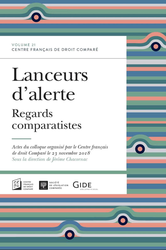
Full reference: Frison-Roche, M.-A., L'impossible unicité juridique de la catégorie des "lanceurs d'alertes" ("The impossible legal unicity of the category of "whistleblowers""), in Chacornac, J. (dir.), Lanceurs d'alertes, regards comparatistes, ("Whistleblowers, comparative perspectives"), Publications of the Centre français de droit comparé ("French Comparative Law Center"), May 2020, Volume 21, p.13-31.
Read the article (in French).
Read the general presentation of the collective book in which this article is published
Read the bilingual working paper which had served of basis for this article.
Read the presentation of the conference "Les lanceurs d'alertes: glose" (Whistleblowers: glose") and especially the slides elabored for the colloquium organized by the Centre français de droit comparé ("French Comparative Law Center") on 23th of November 2018 under the direction of Jérôme Chacornac
____
Introduction of the article
"Whistleblowers". This is a new expression. Which is a great success. Barely heard once, we hear it everywhere ...
A topic not of course or knowledge test, but rather a topic of daily conversation. Because it is spoken to us every day, in more or less gracious terms. For example President Donald Trump on October 1, 2019 declared to the press "want to question" the whistleblower who would have illegally denounced him and would not, according to him, have the right to conceal his identity, proof in this according to him of the lying character of his assertions against him, while his lawyer indicates on October 6, 2019 that he is not speaking on behalf of a single whistleblower thus taken to task but of a plurality of people who gave information against the President of the United States. Even the most imaginative screenwriters would not have written such brutal and rapid twists and turns. Spectators, we are waiting for the next episode, secretly hoping for the escalation.
And precisely if we go to the cinema, it is still a whistleblower whose dedication and success, we are told about, even the drama, for the benefit of global society, and in particular democracy, since the secrets are fought for the benefit of the truth. The Secret Man designates Mark Felt as the first whistleblower. Returning to what we often present as being a more "serious" media!footnote-1391, we listen to France-Culture and here is another story told by a historian who worked as an archivist on events that political power would have liked to keep hidden by possibly destroying their traces but which its trade led to preserve: here it is expressly presented to the studious listeners like a "whistleblower" .... While the same radio tries to find the one who could well be, as in a kind of contest the "first whistleblower"!footnote-1727? .... This rewriting of History can be defended because ultimately what did other Voltaire do for Calas, or Zola for Dreyfus?
It is also a subject of legislative discussion since in the United States the Dodd-Frank law of 2010 inserted in the law of 1934 which established the Securities & Exchanges Commission a complete device of remuneration and remuneration of the whistleblowers, whereas after having developed flexible but guiding lines in this regard in 2012!footnote-1698, the European Commission published on November 20, 2018 the text of what will become a Directive intended to give a unified European status to the character, in the system gradually developed to protect the one who was presented in 2018 as that "cannot be punished for having done what is right".
In Europe, the Directive first approved by a Resolution of the European Parliament on April 16, 2019 on the protection of persons denouncing breaches of Union Law and then adopted on October 7, 2019 (Directive of the European Parliament and of the Council of European Union on the Protection of Persons who Report Violations of European Union Law, different title, it should be noted, will have to be transposed into the laws of the Member States within the next two years. , since only "violations of Union Law" are targeted, but the character of the "whistleblower" is more generally targeted: he is "whole"!footnote-1699.
In short, the whistleblower is a star!footnote-1390. A sort of historical figure, covered in blows and glory, going from Voltaire to Snowden, both of whom find themselves embodied on the screens!footnote-1681 ....,
Consecrated by law, which associates with it a legal regime of protection to such an extent that, like a Nessus tunic, it is this legal regime which will define the character and not the reverse. When we read the law of December 9, 2016 relating to transparency in the fight against corruption and the modernization of economic life, known as "Sapin 2", we notice that the Legislator makes much of this character, since 'he dedicates its chapter II to him!footnote-1682: "From the protection of whistleblowers", and that it is by his very protection that he formally opens the door of Right to him.
But why a plural? Admittedly when we read the recitals of the Community Directive of October 7, 2019 on the protection of whistleblowers!footnote-1702, it is only a list of all the subjects on which it is a good idea to protect them, which therefore prompts us to see in this plural only the index of this non-exhaustive list of subjects which it is good to tell us, a sign of the lack of definition of who should alert us. Reading the French law known as "Sapin 2" makes it less severe but more perplexing. Indeed, this plurality referred to by the title of the chapter devoted to "whistleblowers", there is no longer any question in the rest of the law, in the very definition which follows, article 6 which opens this chapter devoted to "whistleblowers" offering the reader immediately a singular since it begins as follows: "A!footnote-1684 whistleblower is a person ...". No mention of diversity. The art of legislative writing would however have required that the qualifying article not only be singular but that it should not yet be undefined. Stendhal if he had still deigned to have the law for bedside book would have wanted to find at the beginning of chapter a sentence like: "The!footnote-1683 whistleblower is a person ...".
Thus seem to contradict themselves within the law "Sapin 2 the very title which presents the character, in that it uses a defined plural (the) while the defining article which presents it is in the undefined singular (one). ...
Here is a first reason not to advance any more but in a very careful way, in this "step by step" that constitutes a reading word for word: a gloss. This consists of taking the expression itself literally. The second reason for this technical choice is that the gloss is well suited to the introduction of a collective work, thus allowing more targeted developments to take place in other contributions, on the techniques, the difficulties and the limits of this protection, or on its history, or the reasons for the arrival in French law of these whistleblowers and the way they develop, or not, elsewhere.
I am therefore going to content myself with taking this already legal expression to the letter: The (I) whistle (III). blowers (II).

Updated: Oct. 8, 2019 (Initial publication: Nov. 22, 2018)
Publications
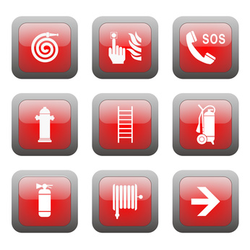
This working paper served as a basis for a conference done in French for the Centre de droit comparé (Center for Comparative Law) in Paris on 23 November 2018.
Updated, it has served as a basis for an article published in French in a book of the Société de Législation comparé (Society of Comparative Legislation).
________
"The whistleblowers". This is a new expression. Which wins a full success. Barely heard once, we hear it everywhere ...
A theme not only of academic teaching, but rather a topic of daily conversation. Because it is every day that we speak about it, in terms more or less graceful. For example President Donald Trump on October 1, 2019 told the press he "wants to interrogate" the whistleblower who would have unlawfully denounced him and would not have, according to him, the right to conceal his own identity, evidence in this according Donald Trump of the false character of his assertions against him, while his lawyer indicates on October 6, 2019 that he does not speak on behalf of a single whistleblower thus taken apart but of a plurality people who gave information against the President of the United States. Even the most imaginative scriptwriters would not have written twists as abruptly or so fast. Spectators, we wait for the next episode, secretly hoping for climbs and slashs.
Precisely if we go to the cinema, it is still a whistleblower whose dedication and success, or even drama, we are told, for the benefit of the global society, and especially of Democracy, since the secrets are fought for the benefit of the truth. Thus, the movie The Secret Man designates Mark Felt as the first whistleblower. Returning to what is often presented as a more "serious" media, for example in France the radio "France Culture" we can learn the story of a historian who worked as an archivist on events that the political power would have wanted to keep hidden by possibly destroying their traces but that his profession led to preserve
It is also a topic of legislative debate since in the United States the Dodd-Frank Act of 2010 inserted in the 1934 law that established the Securities & Exchanges Commission (SEC) a complete system for retribution and remuneration of whistleblowers, while after elaborating guidelines about about in 2012
In Europe, the Directive first approved by a Resolution of the European Parliament on 16 April 2019 on protection of persons reporting breaches of Union law and then adopted on 7 October 2019 (Directive 2019/78 (EU) of the European Parliament European Union and the Council of the European Union on the Protection of Persons Reporting Breaches of Union law, will have to be transposed in the next two years to the legal systems of the Member States. is not general, since only "violations of European Union Law" are targeted but the character of the "whistleblower" is more generally referred to: it is "whole"
In short, the whistleblower is a star
Recognized by national legislations, which associate to him a legal regime of protection to such a point that, like a tunic of Nessus, it is this legal regime which will define his character and not the opposite. When we read the French law of December 9, 2016 relative à la transparence à la lutte contre la corruption et à la modernisation de la vie économique (on transparency in the fight against corruption and the modernization of economic life), usually known as "Sapin 2 Act", we note that the lawmaker makes much of this character, because he devotes to him the chapter II: "De la protection des
But why a plural? Certainly when we read the recitals of the European Directive of 7 October 2019 on the protection of whistleblowers
Thus seem to contradict in this law "Sapin 2" itself the very title which presents the character, in that it uses a definite plural ("the whistleblowers") while the article of definition which presents the topic does it by using the singular indefinite : "a whistleblower....".
This is a first reason to move forward only in a very cautious way, in this "step by step" that constitutes a word-by-word reading: a gloss. This method consists in taking literally the expression itself. The second reason for this technical choice is that the gloss is well suited to an introduction of a collective work, allowing more specific developments to take place in other contributions, for example on the techniques, the difficulties and the limits of this protection, or the history of it, or the reasons for the arrival in French law of these American or Brithish whistleblowers and the way they develop, or not, in other legal systems or other countries.
I will therefore content myself with taking again literally this already legal expression: The (I) launchers (II) of alert (III).
See below developments.
On the more general fact that cinema is undoubtedly the medium which most seriously restores the state of the Law, c. Frison-Roche, M.-A., Au coeur du Droit, du cinéma et de la famille : la vie, 2016.
L'histoire du premier lanceur d'alerte, France Culture, septembre 2019.
European Commission, Guidelines on Whistleblowing, 6 of December 2012, SEC(2012) 679 final, updated on 23 of April 2018.
However, precisely the so common use of plurality ("whistleblowers") raises doubts about the uniqueness of the character. On this question, see. all the first part of the developments of this study, which leads to the conclusion rather than beyond the multitude of particular cases, there are rather two kinds of whistleblowers. V. infra I.
The director of the film La fille de Brest says that she considers the whistleblower at the origin of the case of the Pick as a "movie character".
Thus, the adventures of Snowden were brought to the screen by Oliver Stone in 2016, Snowden. On the question of knowing whether this film "faithfully reproduces" or not the case, Schetizer, P., Le film Snowden est-il à la hauteur de la réalité?, 2017. This article is favorable to the whistleblower, and to the film which tells us with emotion his case, in particular because (sic), it is easier than to read the Washington Post.
Underlined by us.
Underlined by us.
About this directive, v. the developments infra
Underlined by us.
Sept. 14, 2016
Thesaurus : Soft Law
May 3, 2016
Thesaurus

Référence complète : Lasserre Capdeville, J., Quel avenir pour les banques universelles en droit français ?, Petites Affiches, 3 mai 2016.
Les étudiants de Sciences po peuvent lire l'article via le drive dans le dossier "MAFR - Régulation"
L'auteur rappelle que la banque universelle est celle qui pratique à la fois les activités proprement bancaires et les activités financières. La catégorie n'existe pas dans le Code monétaire et financier mais rien n'empêche cette création, l'établissement obtenant d'une part l'obtention d'un agrément pour entrer dans le monopole des prestations de services bancaires et d'autres part d'un agrément pour offrir des prestations de services d'investissement.
June 25, 2015
Conferences
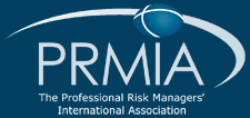
Aller sur le site de PRMIA.
Lire le programme du colloque.
Lire les slides, support de la conférence.
L'Europe a reçu le choc de la crise financière d'une façon différente de la façon dont les États-Unis l'ont reçu : les institutions européennes ont entièrement construit une Europe nouvelle : l'Europe Bancaire. De la même façon qu'en 1945 les chefs de guerre avait dit "plus encore la guerre entre nous", en 2009 les responsables européens ont affirmé "plus jamais de défauts bancaires qui compromettent la paix sociale de nos Nations". À partir de cette volonté purement politique, ce qu'il est convenu d'appeler les trois piliers de l'Union bancaire forment un "bloc", même si les dispositifs techniques se déploient successivement et parallèlement. En effet, la "résolution" est un anglicisme qui désigne une prévention de cessation des paiements lorsqu'elle met en risque un établissement financier, perspective qui risque de déclencher l'obligation pour un État de jouer son rôle de garanti en dernier ressort, recourant à la collectivité du groupe social national.
Ainsi, lorsque l'on regarde les textes organisant le mécanisme de résolution bancaire, on est admiratif devant leur précision et la sûreté du mécanisme. Ce "deuxième pilier" a vocation à bien fonctionner.
Mais il faut garder à l'esprit deux éléments, dont on peut douter parfois que ceux qui ont conçu la mécanique les aient eu toujours en tête.
En premier lieu, il s'agit d'un élément d'un puzzle qui est l'Europe, une Europe qui bouge et se reconstruit dans une cascade de crises dans lesquelles les banques et les États sont imbriqués d'une façon inextricable. Or, le droit de la résolution bancaire semble lisser cela. De la même façon, le droit calme et posé de la résolution bancaire semble ne pas faire place à un personnage qui est et sera pourtant déterminant : le juge. Il serait pourtant judicieux d'y penser toujours, même si l'on est astucieux de n'en parler jamais.
Oct. 22, 2014
Thesaurus : 06.1. Textes de l'Union Européenne
► Référence complète: Directive 2014/95/EU of the European Parliament and of the Council, of 22 October 2014, amending Directive 2013/34/EU as regards disclosure of non-financial and diversity information by certain large undertakings and groups (called "NFRD" (Non Financial Reporting Directive)).
____
________
July 27, 2014
Blog
phone usage in relation to the planes both air traffic control and telecommunications regulation: it is a case of interregulation .
French telecoms regulator, the ARCEP , consequently authorizes companies to operate the phones. But it reflects the need for security, limiting available bandwidth those that are not used by pilots.
Case technically successful interregulation , and it is likely that the re air regulator will therefore abandon its ban.